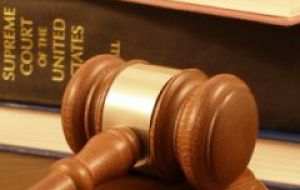MercoPress. South Atlantic News Agency
Argentina before the NY appeals court hoping ‘vulture’ funds litigation extends into 2014/15
 Cleary, Gottlieb, Steen & Hamilton are the lawyers defending Argentina in New York
Cleary, Gottlieb, Steen & Hamilton are the lawyers defending Argentina in New York Argentina filed two appeals before the New York Appeals Court over the dispute with the so called ‘vulture (hedge) funds’. The presentation was made a few moments before the Friday deadline and in the petition Argentina requests the revision of the 23 August ruling which orders Argentina to make effective the full payment of 1.4bn dollars (full face value of defaulted sovereign bonds plus interests) to the claimants.
Argentina is demanding a review of the appeals three-judge court and reconsideration by the whole 14 judges of the Appeals Court. The August ruling confirmed for a second time a decision from Federal Judge Thomas Griesa ordering the full payment.
However while the case is still in process the appeals court decided to delay forcing Argentina to make the payment effective immediately, plus the fact that Argentina announced it has plans to ask the US Supreme Court to weigh in. This would further delay litigation since there are no deadlines well into 2014 or even 2015, whether the high court decided to take the case.
In the petition Argentina pointed to “grave legal errors” in last month’s 2nd US Circuit Court of Appeals ruling that ordered Buenos Aires to pay the money to two hedge (‘vulture’) funds that refused to participate in two debt restructurings.
The case has its roots in Argentina’s 2001 default on almost 100 billion dollars worth of sovereign debt. In two restructuring processes, 2005 and 2010, Argentina managed to convince 93% of defaulted bond holders to accept the new conditions but only 7% remain as holdouts, some of which are the current plaintiffs. Bondholders led by the NML Capital and Aurelius hedge funds took legal action to obtain payment in full.
The appellate court reaffirmed Judge Griesa’s ruling that an equal treatment, or pari passu, clause in the original bond agreements prevents Argentina from treating defaulted bondholders less favourably than exchange bondholders.
The Argentine government has argued that bondholders who took part in the restructuring of the debt, which forced on them huge write-downs of the face value of the bonds, would now be able to lay claim as well for 100% compensation. And that could overwhelm the country’s finances and lead to a fresh default.
“If the decision is not reversed, the injunction is likely to trigger a default on 65 billion dollars worth of exchange bonds held by innocent third parties,” the document read.
“Such a default would have devastating consequences for the EBG (exchange bondholder group), exchange bondholders generally, and for the global economy and the entire system of international sovereign debt restructurings.”
In the ruling the court rejected Argentina’s predictions of economic disaster. “What the consequences predicted by Argentina have in common is that they are speculative, hyperbolic and almost entirely of the republic’s own making” US Circuit Judge Barrington Parker wrote in the court’s opinion.
However Argentina in its latest appeal called the injunction “wholly inequitable” because bondholders who participated in the swap were already forced to accept discounts exceeding 70 cents on the dollar on defaulted bonds.
In a display of willingness to reach a deal with the holdouts and given the three-judge appeals court description of Argentina as “a uniquely recalcitrant debtor”, the government of President Cristina Fernandez sent a bill to reopen the bond swap thus offering the 7% hold-out bondholders the same terms as those of 2010. The bill with support from the opposition was passed.
The Argentine government also gave assurances to (93%) restructured bond holders that the money is already deposited for payments that are due this month, over 2 billion dollars.
In support of Argentina’s position the Bank of New York Mellon Corp., the indenture trustee for Argentina’s restructured bonds, argued that it shouldn’t be forced to halt payments to holders of the bonds if Argentina refuses to obey Griesa. However the court agreed with Griesa’s ruling that BNY Mellon and other institutions involved in the restructured bond payments can’t act in concert with Argentina to violate his orders.
The case is NML Capital Ltd. v. Republic of Argentina, 12-00105, U.S. Court of Appeals for the Second Circuit (New York).





Top Comments
Disclaimer & comment rules-

-

-

Read all commentsMake the buggers pay, they claim they have the funds to do but have blatanly stated that they will not no matter what the ruling is.
Sep 08th, 2013 - 12:54 am 0Oh dear, there's argieland “demanding” again. Courts don't like guilty people making “demands”. I'm no export on NY law, but is the Appeal Court obliged to accept the appeals? Could it not just say that it sees no need for the case to be reviewed or reconsidered? Especially in the case of a “uniquely recalcitrant debtor”. I suggest that the court tells argieland to stop time-wasting. The court has already rejected argieland's claims of economic disaster. The effects on the EBG are irrelevant. Argieland created the EBG. It can “un-create” it by the simple expedient of paying everyone in full!
Sep 08th, 2013 - 05:13 am 0Conqueror, time to add this case as one more ejection to this list.
Sep 08th, 2013 - 06:49 am 0http://www.ejection-history.org.uk/Country-By-Country/Argentina.htm
Commenting for this story is now closed.
If you have a Facebook account, become a fan and comment on our Facebook Page!